#Liver Failure Specialist
Explore tagged Tumblr posts
Text
Liver failure is a serious medical condition that requires immediate attention and specialized care. Dr. Vikrant Kale is a renowned Hepatologist & Liver Failure Specialist in Pune with extensive experience in treating various liver conditions, including liver failure. Dr. Kale has helped numerous patients overcome liver-related disorders and regain their health.
#Liver Failure Specialist#Liver Failure Treatment#Liver Failure Doctor#Liver Specialist#Liver Disease Treatment#Hepatologist#Gastroenterologist
0 notes
Text
The Importance of Early Detection in Liver Failure
Liver failure is a serious health condition that can affect anyone. It occurs when the liver loses its ability to function properly, leading to life-threatening complications. The key to preventing liver failure from worsening is early detection. Dr. Srivatsan Gurumurthy, a leading Liver Specialist and Liver Transplant Surgeon in Chennai, emphasizes that catching liver problems early can save lives and improve overall health outcomes.
Why Early Detection is Important?
The liver is a vital organ responsible for filtering toxins, producing bile, and aiding in digestion. When the liver starts to fail, these essential functions are compromised. Early detection allows for timely medical intervention, preventing the condition from escalating to the point where a liver transplant might be the only option. Dr. Srivatsan Gurumurthy, who practices at GEM Hospital and SS Surgical Clinic in Chennai, explains that liver diseases like cirrhosis, hepatitis, or fatty liver disease can progress silently without showing clear symptoms. By the time noticeable signs like jaundice, abdominal pain, or fatigue appear, the damage is often significant. That’s why regular liver check-ups are critical, especially for high-risk individuals.
How to Detect Liver Failure Early?
Routine Screening: Regular liver function tests (LFTs) can detect abnormalities in liver enzymes, which may indicate damage even before symptoms appear.
Ultrasound and Imaging: Advanced imaging techniques, such as ultrasound or CT scans, can help in identifying liver inflammation, fibrosis, or tumors.
Biopsy: In certain cases, a liver biopsy might be needed to assess the extent of liver damage.
Consulting a Liver Specialist: If you experience unexplained fatigue, loss of appetite, or dark urine, it’s crucial to consult a liver specialist like Dr. Srivatsan Gurumurthy. He can provide a thorough diagnosis and recommend appropriate treatments.
Treatment Options for Liver Failure:
Depending on the stage and severity of liver damage, Dr. Srivatsan Gurumurthy offers a range of treatments from medication and lifestyle changes to advanced surgical procedures. In severe cases, liver transplant surgery may be required. Dr. Srivatsan Gurumurthy, being an expert in liver transplants, has helped numerous patients recover and lead healthy lives.
Why Choose Dr. Srivatsan Gurumurthy?
Experienced Liver Specialist in Chennai: Dr. Srivatsan Gurumurthy has years of experience in diagnosing and treating complex liver diseases.
Expert in Liver Transplant Surgery: He is one of the few doctors in Chennai specializing in liver transplant surgeries, ensuring high success rates.
Comprehensive Care: From diagnosis to post-operative care, Dr. Gurumurthy provides a holistic approach to liver health.
State-of-the-Art Facilities: He practices at GEM Hospital, Chennai, equipped with the latest medical technologies and a dedicated team.
Patient-Centered Approach: Dr. Gurumurthy believes in personalized treatment plans tailored to each patient’s unique condition.
Early detection of liver failure is crucial for effective treatment and recovery. Dr. Srivatsan Gurumurthy, a renowned liver cysts treatment in Chennai, offers expert care in liver diseases and transplant surgeries. If you are experiencing any symptoms or have concerns about your liver health, consult Dr. Srivatsan Gurumurthy at GEM Hospital, Chennai, or SS Surgical Clinic for the best treatment options.
Go Ahead Book An Appointment with Liver Diseases Treatment in Chennai!!!!!!
#Liver Failure#Best Liver Failure Treatment in Chennai#Liver Failure Treatment in Chennai#Liver Specialist in Chennai#Liver Surgeon in Chennai
0 notes
Text
If you are facing challenges related to liver health or suspect liver failure, don’t wait for the condition to worsen. Liver failure is a serious condition that can arise from various underlying liver diseases and requires immediate and effective treatment. At Kaizen Gastro Care, led by Dr. Vikrant Kale, we specialize in diagnosing and treating liver failure with a holistic approach tailored to each patient’s unique needs.
#Liver Failure Treatment#liver specialist#fatty liver disease treatment#liver disease treatment#gastroenterologist#hepatologist
0 notes
Text
Lose weight without sacrificing taste, thanks to Java Burn Coffee's delightful flavor
Java Burn Coffee: A Delicious Way to Weight Lose
#weight#weightloss#weightspo#weightlos#weighti#gay#transgender#cats of tumblr#free palestine#gravity falls#healthbenefits#healthyeating#healthdiet#probiotics#microbiota#probiotic#gutmicrobiota#probioticsfood#gut microbiota#stomach specialist in navi mumbai#liver failure#health#fitness
0 notes
Text

#liver specialist in navi mumbai#best endoscopist in navi mumbai | dr sonali gautam#stomach specialist in navi mumbai#should we need regular screening for hepatitis b?#liver transplant specialist in navi mumbai#health#fitness#liver failure
0 notes
Text
Revolutionizing Heart Health with SeekMed: Your Personalized Health Companion
In today's fast-paced world, maintaining good heart health is more important than ever. Heart disease continues to be a leading cause of mortality worldwide, but advancements in technology are now providing us with innovative solutions to proactively monitor and manage our cardiovascular health. Enter SeekMed, the groundbreaking mobile application that empowers individuals to take control of their heart health like never before. In this blog, we will explore how SeekMed is revolutionizing the way we approach heart health, offering personalized insights, real-time monitoring, and a comprehensive support system.
Personalized Heart Health Insights:
SeekMed understands that each individual is unique, and so is their cardiovascular health. By leveraging cutting-edge artificial intelligence algorithms, SeekMed provides personalized insights into your heart health. The app analyzes your health data, including vital signs, activity levels, and lifestyle habits, to create a detailed profile of your cardiovascular well-being. Through interactive dashboards and easy-to-understand visuals, you gain a comprehensive understanding of your heart health status, allowing you to make informed decisions for a healthier lifestyle.
Real-Time Monitoring and Alerts:
SeekMed takes heart health monitoring to a whole new level with its real-time tracking capabilities. Using compatible wearable devices, the app continuously monitors your heart rate, blood pressure, and other vital metrics. It provides instant feedback and alerts if any irregularities or potential risks are detected, ensuring that you can take immediate action and seek medical attention if necessary. With SeekMed, you have a personal health companion right at your fingertips, always looking out for your well-being.
Comprehensive Health Management:
SeekMed goes beyond simple monitoring by offering a comprehensive health management system. The app allows you to set personalized health goals and tracks your progress over time. Whether it's achieving a target heart rate during exercise or adhering to a medication regimen, SeekMed provides you with reminders, motivation, and guidance throughout your journey. Additionally, it offers personalized recommendations for a heart-healthy diet and exercise regimen, ensuring you have all the tools necessary for a balanced and proactive approach to cardiovascular wellness.
Seamless Collaboration with Healthcare Providers:
SeekMed recognizes the importance of collaboration between patients and healthcare providers in managing heart health. The app facilitates seamless communication between individuals and their healthcare professionals. Users can securely share their health data, including activity logs, vital signs, and symptoms, directly with their physicians. This enables timely interventions, personalized treatment plans, and continuous monitoring, fostering a stronger doctor-patient relationship built on trust and collaboration.
Supportive Community and Resources:
SeekMed fosters a supportive community of individuals dedicated to improving their heart health. The app offers forums, discussion boards, and social networking features where users can connect, share experiences, and offer encouragement to one another. Additionally, SeekMed provides a wealth of educational resources, including articles, videos, and expert advice on various aspects of heart health. With SeekMed, you're never alone on your journey towards a healthier heart.
SeekMed is revolutionizing the way we approach heart health by providing personalized insights, real-time monitoring, comprehensive health management, and seamless collaboration with healthcare providers. With its user-friendly interface, advanced technology, and supportive community, SeekMed empowers individuals to take an active role in maintaining and improving their cardiovascular well-being. By leveraging the power of modern technology, SeekMed is shaping a future where heart disease is better understood, prevented, and managed. Download SeekMed today and embark on your path to a healthier heart. Your heart health journey starts now!
#best cardiologist in delhi#best gastroenterology hospital in india#liver transplant#liver failure#liver disease#liver cancer#gynecologist#cardiology#health#best cardiologist in India#heart health#heart disease#cardiologist in Delhi#best heart specialist in India#best heart doctor in India#heart problems
0 notes
Text
I also spend a lot of time trying to convince people to prevent problems, because prevention still works better than cures. Don't fucking smoke! I would instantly become the best doctor who ever lived if I could just convince all my patients to quit smoking. Avoid alcohol! Don't do meth! Don't do fentanyl! Things that are poisons will poison you in ways you understand, in the short term, but also ways you can't really understand until you've watched dozens of people die from it thirty years later, struggling to breathe from their COPD or weak and nauseated beyond bearing from their end-stage liver disease. I watched a man take 3 weeks in the ICU to die from what meth did to his heart. Your heart isn't meant to beat 145 times a minute for weeks on end. Your liver isn't meant to metabolize 5 shots of gin a day. You aren't going to be able to use denial and willpower to repair the damage your own habits did.
I drink a lot less now than I did before I went into medicine. Lot of different reasons, including that I'm older and more settled. But I can't look at it the same way I used to; I can't brush off as a "fun quirk" what I know is alcohol use on a level that risks withdrawal seizures if they were to suddenly stop, like some of my family members do, nervously asking me about their loved one's drinking when we're alone because beneath the jokes they know it's a problem.
If you're having more than one, maybe two drinks a day on average, over a long period of time, you are damaging your body in ways you don't understand. You're setting up a permanent heightened inflammatory state. Your heart cells don't like alcohol; Google "alcohol-induced cardiomyopathy." Your esophagus and stomach respond to incessant bathing in poison by first developing wounds and then cancer. Your liver, of course, doesn't like it. Your liver not only converts poisons to harmless substances you can excrete, it also makes your platelets, so your blood can clot. It makes albumin, a protein that's essentially for keeping water in your blood vessels and not letting it leach into your tissues. So people who are dying of liver failure are in pain and weak and tired and sad the whole fucking time! And the only solution, a liver transplant, will come with a lifetime of medication and specialist check-ups and the knowledge that if you fuck up and kill this liver, too, no one is going to be eager to give you another try.
I don't guilt-trip my alcoholic patients with liver disease. I don't guilt-trip my smokers with COPD. They chose to cope with substances for reasons, even if I disagree with their reasons, even if those reasons are opaque to me. They will suffer the natural consequences of those actions whether I guilt-trip them or not. I want them to continue to see me, I want them to be honest with me. Other people will lay enough guilt on them. And nothing I can say or do would ever compare to the physical and mental suffering that goes with those diseases.
But if you can prevent these diseases in yourself, prevent them. Quit smoking. Do it now. Your lungs are going to look better starting almost immediately, with positive changes continuing for many years. Drink less alcohol. Sure, it's fun, sure, it's a longstanding human tradition, but it is also unfortunately a straight up poison and your body knows that no matter how persuasively you argue about the obvious failure of Prohibition. You can't argue with a cell. You can't convince your kidneys that high blood pressure shouldn't damage them. They are a system; they do what they do; they existed long before prefrontal cortex existed to justify what we want to do but know to be harmful.
1K notes
·
View notes
Text
Lifetime: Travis Wheatley x Reader
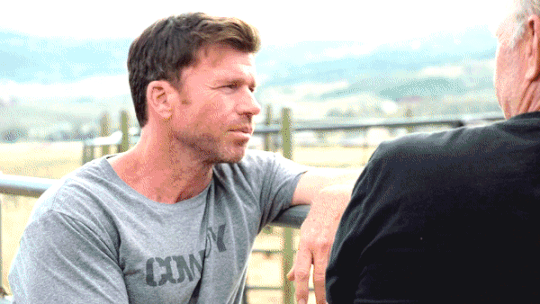
Tagging: @kmc1989 @pear-1206 @keyweegirlie @nu1freakshow

Travis thinks about you all the time when he’s on the road. His dreams are filled with the taste of your honey on his lips and the sound of your ecstasy in his ears. You presence is nothing more than a memory when he’s on the rodeo circuit but those other girls, the belt bunnies, they don’t get a second look.
You’re the only person he trusts with the news that his condition has deteriorated, that he’s now in liver failure. It’s a wakeup call, especially for the man who thought that he was going to live forever.
“I’ve done everything you told me.” He argues with the specialist. “I’ve quit the drinking, changed my diet…”
“That’s just the way it goes.” He’s told in a sterile room with his scans hanging up on the wall for him to see. “Sometimes the damage is too great.”
He flies to Yellowstone that afternoon from Texas because he can’t stand another minute away from you.
“I’m dying.” He tells you as he lays tangled up in bed with you, his thumb ghosting over the apple of your cheek as he looks into your eyes. “The end, it’s coming quicker than I thought.”
He expects you to leave because this is a burden he wouldn’t wish on anyone. He’s going to get sicker, it’s just a matter of time. It breaks his heart because he offered you a future and now he’s ripping it away.
“You promised me a lifetime.” You whisper against this lips as your fingertips trace along his grizzled cheek. “I’ll take whatever’s left of yours.”
He doesn’t think he can love you more than he does in that moment.
You go on the road with him. You leave behind your home, your job, your life because you want to spend the rest of the time you have together loving him.
When you start to compete for the first time in three years, he’s exhilarated. He’s seen you race in Yellowstone, he’s watched you train the up and commers but he’s never seen you in your element. When you win, there’s a fire in your eyes, a passion that he recognises in his own heart. He’s never felt as proud as he does in that moment. He’s weaker these days but he’s still there to lift you down from your horse when you trot back to the paddock. He can’t express the joy he feels at the sensation of you in his arms as the crowd cheers.
“We should start telling people.” You say as you press a cold compress to the back of his neck after he spends the morning throwing up. “You’re going to have to stop soon.”
He knows you’re right but he can’t face that right now, once people smell weakness on the circuit you’re as good as gone and he wants to compete as long as he can.
It’s when he takes that fall that everything changes. One minute he’s in the midst of wrangling a calf in the centre of a televised arena, the next he’s waking up on the dusty floor in the recovery position, vomiting his guts out.
“Why didn’t you tell me?” Rip demands when he wakes up in a hospital bed surrounded by brightly coloured flowers and helium balloons. He counts at least seven horse plushies littered around the room.
“You know why.” Travis says forcefully.
Rip sighs as he tucks his hands into the pockets of his jacket because yea, he gets it.
“I’m a match.” He says finally. “I got tested while you were out. The docs are getting it on the books as we speak.”
“Rip.” Travis says, his voice rough with emotion. “I can’t ask you to do that.”
He knows the repercussions of this surgery. Rip will be out of action for six months maybe a year. Travis has the means to weather that but Rip, he doesn’t.
“You always were a stubborn son of a bitch.” Rip says before he tilts his head towards the glass window. Travis can see you on the opposite side, your arms crossed over your chest as you talk to his doctor. “If you won’t let me do this for you, then let me do it for your girl, let me do it so that the two of you can live a long, happy life together.”
Travis can’t find a way to argue with that because that’s all he wants, more time, with you, with Rip, with all the people he actually gives a shit about.
That evening he calls John Dutton to his hospital room and they begin to make arrangements. Between them they make sure that Rip’s going to be taken care of throughout the duration of his recovery, no matter how long it may take.
It isn’t until the day of the surgery that Travis realises just how terrified of hospitals Rip actually is. He endures the checkups through gritted teeth, he keeps his gaze trained on the TV, switching the channels constantly in an attempt to distract himself. Travis, he’s an old hand at this shit by now, he’s spend the past year in and out of treatment but Rip…
This is the longest he’s ever been inside one.
“I’m buying you a fucking horse after this.” Travis tells him as he tips his head towards the other man. “An expensive one, a stud. You’ll make four, five grand everytime the thing pops a woody.”
“I don’t want a fucking horse.” Rip tells him as he turns off the TV and gestures to the pony plushie nestled against Travis’s chest, Rip has a matching one that he keeps stroking his fingers over. “What I want is for you to marry that girl as soon as you get out of here.”
“Can’t do that if I don’t have a best man.” Travis remarks as he studies the cuddly toy once more. It looks exactly like his rodeo horse Crash.
“OK.” Rip tells him, tucking his own plushie underneath the crook of his arm. “You pop the question and I’m there, you just tell me where and when.”
Love Travis? Don’t miss any of his stories by joining the taglist here.
Like My Work? - Why Not Buy Me A Coffee

132 notes
·
View notes
Text
Reading TGCF: Chapter 33

For those who don't know, I am reading TGCF for the first time and sharing my thoughts!
If you have not read it, there will be spoilers! Consider this a warning.
Also- if you want to follow along, I am aiming to post updates daily. You can find all the posts in the tag Bloopitynoot reads TGCF. You can also check out the intro post for context on my read BUT if you followed along with my SVSSS read, the rules and vibe are the same.

I was really exhausted yesterday because it has been A Time. We had Charlie's appointment, but I have also been super busy with work and union things.
Charlie update: For those who didn't know, my sweet boy Charles had some super concerning bloodwork a month ago and his specialist appointment to get him checked out was Tuesday.
His appointment was 4 hours long they did a full blood panel, physical exam, and an ultrasound. Thankfully he doesn't appear to have any masses. They found a little heart murmur (they were not so concerned about it right now) and his liver did look darker than normal. They suspected he has a liver infection (our boy is on anti-biotics). In two weeks we will follow up with another blood test and see how his levels are.
But for now better than I thought to be honest. I was so scared it was cancer or fully liver failure.
Taking a breath, enjoying a comfort black tea
Let's get into chapter 33!!!

Oh buddy, over here neglecting prayers for his sad rain side quest. p73
Okay, but could he not give the rain hat to someone else, like Mu Qing or Feng Xin and have them do it while he took care of his own prayers? p74
ooof. And then in Xianle, they're just imprisoning refugees, because they make the land look less aesthetic. So gross. p75
Fuck. Again I am struggling with the themes ins this book. All these people blaming their issues on the refugees, poor, and non-citizens of xianle is so awful. I hate this rhetoric so much. It's too real right now. p78
Ah, my question from earlier was answered. The hat requires a shit-ton of spiritual power (probably why only he can really do it) p81
Expelling the refugees is just horrible. p83
Xie Lian is just running himself ragged with his day divided into thirds. Do heavenly officials have to sleep? p85
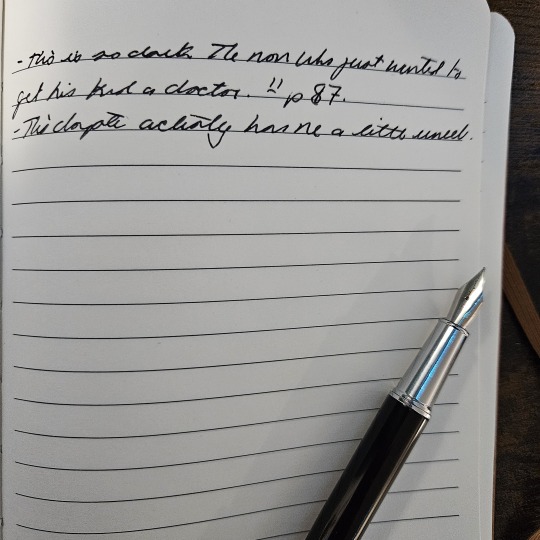
This is so dark. I literally had to put the book down and walk away for a second. The entire scene with the kid being ill and his father climbing the wall really fucked me up. :( p87
This chapter actually has me a little unwell.
I don't even have any comments
This was incredible hard to read. I can't help but drawing parallels to the the state of the world right now and it is really messing with me. Especially with the social othering and dehumanizing people based on their status as refugee or "other"; I can't.
#bloopitynoot reads tgcf#tgcf mxtx#tgcf spoilers#tgcf#mxtx#heaven official's blessing#this was a really hard chapter
31 notes
·
View notes
Note
Humanformers retired trio
This is a sad question. You mentioned that Ratchet died earlier from the disease. The question is, how did they find out about the disease? How exactly did he react and how did Optimus and Ironhide react? I imagine that the night they found out about the disease, Optimus and Ironhide hugged, kissed and probably cried all night. And towards the sad end, they were afraid to leave Ratchet's side and took turns keeping vigil by his side. I know it's sad, but I really need to know. 😢
I've decided there are two endings to this AU. The good ending, where they live happily together until the end, where old age took them in quick succession.
Then there's the bad timeline, where Ratchet dies of cancer, Ironhide of heart failure, and Optimus lives into his 90s, alone and depressed.
By the time Ratchet learned he had cancer, it was stage 4 metastatic.
At first he attributed the slight weakness he was feeling to age. The slight loss of appetite he contributed to the fact he didn't feel like eating massive meals at this point in his life. Even the pain in his abdomen came and went, and Ratchet passed it off as a result of sleeping wrong.
That was until Chromia took him aside one day while the trio was hanging with friends. She asked him very pointedly if he was okay. Not a "how have you been?" okay, but "you don't look well" okay.
Chromia was never one to mince words. She cared for Ratchet and mentioned how much weight he had lost. His face was looking more sunken. He was holding himself differently, his posture changing, something Ratchet hadn't noticed but now he realized he was compensating for the pain which every day was becoming more persistent.
She even mentioned his breathing seemed a bit labored, and somewhere in the medic's brain he was suddenly piecing things together. He had brushed everything off, but if others were taking notice...
As he mulled over Chromia's observations that night, a heaviness settled in his gut. He was a surgeon. He knew what this could mean. How could he have not seen it sooner?
One oncologist visit turned into four. Each blood test and scan and consultation relaying the same information.
Ratchet was barely listening to the specialists. He knew what he was looking at. Cancer on his pancreas had spread to his liver and lungs. There were too many tumors to operate.
He was going to die.
Ratchet had gone to these appointments alone, afraid yet to tell his husbands. He wanted to be sure, and not scare them with false positives.
It was a simple Wednesday evening when Ratchet broke the news after dinner. An otherwise uneventful day had preceded it. But it was a night Optimus and Ironhide would never forget.
Ironhide asked, rather angrily and incredulously, if this was a sick joke. But Ratchet held firm. He had the results on hand and showed the two the masses that had invaded his organs.
Optimus was silent the whole time Ratchet explained. A million regrets played in his brain, from not saying "I love you" enough, to letting Ratchet slip through his fingers and into Lockdown's arms all those years ago.
When he found his voice, his words were thick and strained.
"How long, Ratchet?"
"A year. If I'm lucky. But...three, maybe four months."
While Ratchet was in bed that night, Ironhide and Optimus sat on the porch looking at the stars. Ironhide was ranting angrily. At the situation, at himself for not noticing Ratchet's declining health. For all the years they had planned together snuffed out like a sputtering candle.
He lashed out at Optimus for the other man's silence, only stopping when he saw tears spilling over Optimus's cheeks in the moonlight.
"You are not the only one grieving, Ironhide."
In the following weeks, the cancer grew further, sapping Ratchet's strength. He barely wanted to eat. He was in constant pain as the tumors pressed on surrounding tissue. His breathing became more labored.
Ironhide and Optimus made sure to be at Ratchet's side as much as possible as Ratchet began to fade.
Then one morning, Ironhide and Optimus could barely believe as Ratchet strode out of the bedroom holding his head high. He sat at the table and devoured a full stack of his favorite pancakes cooked by Optimus. Eggs, bacon, two glasses of juice. He packed it away.
His husbands were hesitant to be optimistic at such a turnaround, but they couldn't help it. Ratchet hadn't eaten like that in months!
For the rest of the day, they marathoned Ratchet's favorite movies, the medic tucked in a cocoon of blankets with Ironhide and Optimus on either side of him. They laughed and nuzzled and kissed, petting over each other in the gentlest of touches and played footsy like they were teenagers again.
The day seemed to drag on, and in hindsight, Ironhide and Optimus would be glad for that.
They snuggled into bed together that night, Ratchet between them. They exchanged kisses again, over ears, lips, noses.
And as Ratchet slipped off to sleep, he uttered what would be his final "I love you."
#humanformers retired trio#I have someone in my family that was recently diagnosed with pancreatic cancer#thankfully it was caught very early and treated#but I think in a way this is helping me to process some feelings about the diagnosis
4 notes
·
View notes
Text
So hey!
Fun fact! Did you know that acute liver failure massively fucking sucks and having to get admitted to the hospital for over a week because the doctors you were going to for help spent a year pissing about ordering tests rather than refer you to a liver specialist is a special kind of hell?
This is not an experience I recommend! Like at all!
Upside is I've been out of the hospital for a month and while the recovery process is FUCKING AGONIZING because I'm on like five different medications that have pickled my brain in a soup of chemicals and edema fluid, my levels are steadily recovering and the most aggressive of the medicine regime is being tapered off.
Downside 2 Electric Boogaloo is once I actually balance out to something normal it'll be time to check the liver again and see if I just need lifelong medication or a liver transplant because liver damage is, like, permanent.
Good news is I'm alive though, which I might not have been because, again, the doctors I had been going to for a year for help didn't bother to do more than order ultrasounds and an MRI (and then a CT scan when the MRI "only" showed signs of cirrhosis of my liver), and the only reason I got admitted to the hospital was because my symptoms suddenly worsened, I had to take three days off work and went to urgent care for a doctor's note, and they immediately sent me to the ER.
I am no longer seeing any of those doctors :)
5 notes
·
View notes
Text
Experts Advise, Offer New Vaccination for Pet Rabbits
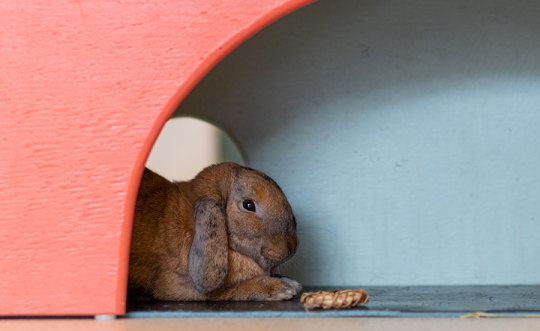
COVID-19 hasn’t been the only global pandemic arriving on our shores recently. A new variant of rabbit hemorrhagic disease virus (RHDV), previously common in wild rabbits in Europe, Asia, and Australia, was first detected in the United States in early 2020. It has now spread to multiple states in the U.S., particularly the western states.
How to Get the Vaccine
Vaccination clinics for RHDV will be held on the following dates at Veterinary Medicine South Clinic 2100 S Goodwin Ave, Urbana. Clinic Dates: * August 18, 2023 * September 15, 2023 * October 13, 2023
Call for an appointment: 217-244-2555
On July 13, 2023, the first case of RHDV was detected in the state of Illinois in a pet rabbit. The case was in Cook County. Prior to this detection, the disease had not been diagnosed in wild or domestic rabbits. This detection raises the level of concern for the health implications of both wild and domestic rabbits within Illinois.
If RHDV is detected or suspected in wild or domestic rabbits, it must be reported to the World Organisation for Animal Health.
Dr. Michelle Borsdorf, a board-certified specialist in zoological medicine at the University of Illinois Veterinary Teaching Hospital in Urbana, recommends that all pet rabbits be vaccinated against this new variant (RHDV2), which is more dangerous than earlier forms of the virus. This variant of RHDV has 70% to 100% mortality rates in pet rabbits.
Its presence in Illinois emphasizes the need to act now to vaccinate and protect against this disease!
What Is RHDV?
Rabbit Hemorrhagic Disease Virus is a member of the calicivirus family. Other viruses in this family that do not cause rabbit health issues include norovirus, the most common cause of gastroenteritis (vomiting and diarrhea) in people, and a feline virus that causes respiratory disease.
RHDV infects wild and domestic species of rabbits and is highly contagious. It does not infect people or other animals. The virus travels through the blood stream of an infected rabbit and rapidly damages the cells of the liver. The liver makes proteins used in forming blood clots, and the classic form of RHDV causes uncontrollable bleeding in rabbits.
Clinical signs of rabbits infected with this virus will primarily include bleeding from the eyes, nose, or mouth, as well as jaundice (yellow discoloration of eyes and skin), which are related to severe liver dysfunction or failure. Affected rabbits may also develop respiratory or neurologic symptoms, or even present with more generalized signs of illness such as lethargy, reduced appetite, and lack of defecation or urination.
“Additionally, some rabbits do not exhibit symptoms prior to succumbing to the disease. This outcome, known as sudden death, illustrates how rapidly the disease can progress,” says Dr. Borsdorf.
How Does RHDV Spread?
Unfortunately, the virus survives well in any environment. Infected wild rabbits may shed the virus outside, and the virus can then be carried into the home on people’s clothing or shoes and introduced to pet rabbits. Any rabbit exposed to blood, urine, or feces of an infected rabbit could develop infection.
Because RHDV is spread between rabbits, Dr. Borsdorf advises taking steps in your home to reduce the risk of RHDV infection.
Do not allow your pet rabbit to graze in outdoor areas that are frequented by wild rabbits.
Ensure that shoes worn outside are not worn in areas of the home where your pet rabbit has access.
Weeds and flowers from outdoor areas frequented by wild rabbits should not be fed to pet rabbits.
Always wash your hands before and after handling rabbits.
Vaccinate your pet rabbit.
Vaccination Against RHDV
In other countries where RHDV circulates, vaccinations against the virus are given to pet rabbits. Now that the threat to rabbit health is present in the U.S., the U.S. Department of Agriculture has authorized emergency use of the vaccine here. Distribution of the vaccine to veterinarians began in 2021.
Although the vaccine does not yet have full FDA approval, the approval process is ongoing. Preliminary research suggests that the vaccine is safe and effective in preventing infection. This is based on a challenge study performed where 100% of vaccinated rabbits survived when exposed to the virus, while 70% of the unvaccinated rabbits died from the disease.
Side effects of the vaccine have included mild swelling at the injection site and mild fever or lethargy for a few days after the vaccine is administered. To be effective, the vaccine requires two doses administered at least 3 weeks apart, and annual boosters thereafter.
Vaccination at the University of Illinois
The zoological medicine service will continue hosting vaccine clinics to administer vaccines and their boosters to pet rabbits once monthly. (See sidebar above for the current list of dates.) Veterinary interns, residents, and students as well as certified veterinary technicians will be involved in this process under supervision of faculty members. including Dr. Borsdorf, head of the zoological medicine service.
Because the clinic is focused on delivering vaccine to healthy animals, no diagnostic testing will be performed at that time.
Because of how the vaccine is packaged, vaccination will be offered only through the scheduled vaccine clinics and not through regular appointments with the zoological medicine service at the Veterinary Teaching Hospital.
To make an appointment for your rabbit to receive the vaccine, please call the Veterinary Medicine South Clinic at (217) 244-2555.
For more information, visit:
https://www.aphis.usda.gov/publications/animal_health/fs-rhdv2.pdf
https://rabbit.org/faq-for-medgenes-rhdv2-vaccine/
3 notes
·
View notes
Text
When it comes to liver health, the terms “acute” and “chronic” are important for diagnosing and managing liver diseases. Dr. Srivatsan Gurumurthy, a recognized specialist in liver disease treatment and liver transplant surgery at GEM Hospital, provides invaluable insights into understanding these concepts and their implications for patient care.
#Acute and Chronic Liver Damage#Best Liver Transplant surgeon in Chennai#Liver Failure Tratment in Chennai#Liver Failure#Liver Disease Treatment in Chennai#Best Liver Specialist in Myphore#Chennai
0 notes
Text
How Java Burn Coffee Supports Your Weight Lose Journey
#weight#weightloss#weightspo#weightlos#weighti#gay#transgender#cats of tumblr#free palestine#gravity falls#healthbenefits#healthyeating#healthdiet#probiotics#microbiota#probiotic#gutmicrobiota#probioticsfood#gut microbiota#stomach specialist in navi mumbai#liver failure#health#fitness
0 notes
Text
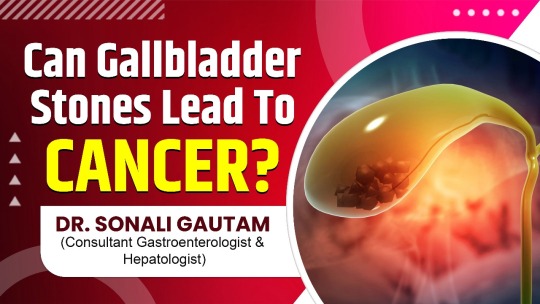
#Gastroenterology Doctor and Liver Specialist Doctor in Navi Mumbai#liver specialist in navi mumbai#should we need regular screening for hepatitis b?#best endoscopist in navi mumbai | dr sonali gautam#liver transplant specialist in navi mumbai#stomach specialist in navi mumbai#liver failure#health#fitness#healthdiet
0 notes
Text
Best Liver Transplant Center – Restoring Lives with Excellence
Liver transplant surgery is a life-saving procedure that offers hope to patients suffering from end-stage liver disease, liver cancer, or acute liver failure. With the advancement of medical technology and surgical expertise, liver transplantation has become highly successful, improving the quality of life for thousands of patients. Finding the best liver transplant center is crucial for ensuring optimal care, advanced treatment options, and long-term recovery.
Understanding Liver Transplantation
A liver transplant involves replacing a diseased liver with a healthy one from a donor. It is performed when the liver fails to function properly due to conditions like cirrhosis, hepatitis, genetic disorders, or liver tumors. The procedure requires a team of highly skilled surgeons, transplant specialists, and post-operative care providers to ensure the success of the transplant.
Why Choose a Specialized Liver Transplant Center?
Selecting the right hospital for liver transplantation is vital for achieving the best results. A leading liver transplant center should offer:
Advanced surgical techniques – Minimally invasive procedures for reduced recovery time.
Comprehensive transplant programs – Both living and deceased donor liver transplants.
Experienced medical team – Specialized transplant surgeons and hepatologists.
Cutting-edge technology – Latest diagnostic tools and robotic-assisted surgery.
Post-transplant rehabilitation – Long-term care for improved patient outcomes.
Preethi Hospitals, Madurai – A Trusted Destination for Liver Transplantation
When it comes to the best liver transplant center, Preethi Hospitals, Madurai, stands out as a premier healthcare institution offering state-of-the-art transplant services. The hospital is equipped with modern medical infrastructure, highly skilled professionals, and a patient-centric approach that ensures successful transplant outcomes.
State-of-the-Art Liver Transplant Facilities
Preethi Hospitals is dedicated to providing world-class liver transplant care with advanced facilities, including:
High-tech operation theaters with modern surgical instruments.
Specialized liver transplant ICUs ensuring intensive post-operative monitoring.
Comprehensive donor evaluation programs to assess donor suitability and minimize risks.
Personalized treatment plans to cater to individual patient needs.
Comprehensive Liver Transplant Program
Preethi Hospitals offers a well-structured liver transplant program that includes:
Living Donor Liver Transplant (LDLT) – A portion of a healthy liver from a living donor is transplanted into the patient.
Deceased Donor Liver Transplant (DDLT) – The entire liver is transplanted from a deceased donor.
Split Liver Transplantation – A single liver is divided and transplanted into two recipients.
Pediatric Liver Transplant – Specially designed for children with liver diseases.
Advanced post-transplant care – Continuous monitoring and lifestyle guidance for long-term success.
Success Rate and Expertise
Preethi Hospitals boasts a high success rate in liver transplantation, ensuring that patients receive the best possible care. Their expertise in managing complex liver diseases and complications makes them one of the most sought-after transplant centers in South India.
Post-Transplant Care – A Key to Long-Term Recovery
Successful liver transplantation is not just about surgery; it also involves lifelong care and monitoring. At Preethi Hospitals, patients receive:
Regular follow-ups and health assessments to detect any early signs of rejection.
Diet and lifestyle modifications to ensure liver health.
Immunosuppressive medication management to prevent organ rejection.
Counseling and support groups for emotional and psychological well-being.
The Road to a Healthier Future
Choosing the best liver transplant center plays a crucial role in determining the success of the procedure. With a commitment to excellence, cutting-edge medical technology, and compassionate care, Preethi Hospitals, Madurai, stands as a beacon of hope for patients seeking liver transplantation.
If you or a loved one is in need of a liver transplant, Preethi Hospitals offers a safe, reliable, and patient-friendly environment to undergo this life-saving procedure. Trust the experts, embrace a healthier future, and experience the best liver care available today.
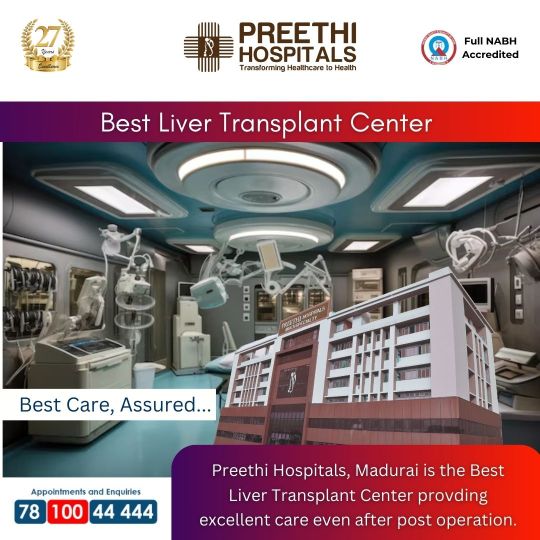
0 notes